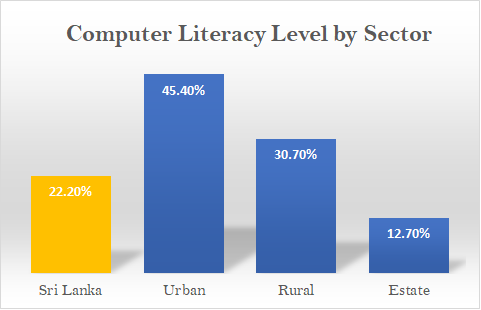The term computer literacy refers to the ability of a person to use a computer on his/her own and is calculated for the age group from 5 to 65 years. Computer literacy is considered different from digital literacy as computer literacy is limited to the use of computers, while digital literacy considers of all digital devices including computers, tablets and smartphones. Nevertheless, computer literacy is given significance in the United Nations Sustainable Development Goals (UNSDG), where improving Information Communication Technology (ICT) skills are included in the target 4.4 under the large umbrella of target 4; quality education. Sri Lanka has made commendable progress in improving ICT skills among children and adults, as given in Figure 1:
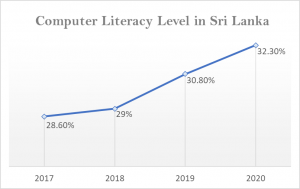
The overall computer literacy level in Sri Lanka has grown to 32.3% in 2020 from 28.6% in 2017, which is a remarkable progress given that Sri Lanka is categorized as a developing country. In other words, nearly one out of three persons in Sri Lanka can use a computer without any assistance. Thus, Sri Lanka in on track towards achieving target 4.4 of UNSDG, which is to substantially increase the number of youth and adults who have relevant skills, including technical and vocational skills, for employment, decent jobs and entrepreneurship by 2030. However, a closer look at different sectors (urban, rural and estate) dilutes the aforesaid overall progress in creating computer literacy (See Figure 2).
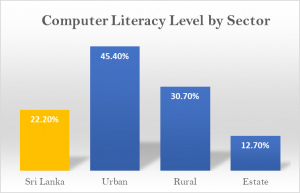
The computer literacy level in the urban sector is reported as 45.40%, which is much higher than the national average of 32.3%. Access to education facilities and high device ownership have resulted in aforesaid high computer literacy among the urban population. On the other hand, the rural sector reports a computer literacy of 30.70%, which is marginally lower than the national average. In a sharp contrast, the computer literacy in the estate sector is reported as 12.70%, which is extremely low in comparison to the national average (32.3%). This dire situation highlights the inequality in the ICT education in Sri Lanka, paving the way for a high digital divide by creating a significant gap between digital haves and digital have nots. Despite UNSDG 4.5 aiming to ensure equal access to all levels of education and vocational training for the vulnerable communities, Sri Lanka still lags behind in terms of providing ICT education for estate population; a large vulnerable community that tirelessly contributes towards the country’s economy.
- Device Ownership
Among several reasons for unsatisfactory computer literacy in the estate sector, low level of device ownership is a critical factor, as highlighted in Figure 3:
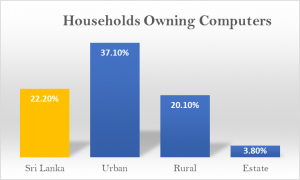
Households owning a computer in the estate sector lingers at 3.80%, which is extremely low compared to the national average of 22.20%, rural sector (20.10%) and urban sector (37.10%). Lack of device ownership in the estate sector compared to urban and rural sectors is fueled by the low affordability, resulting from the low-income level of the minimum wage earners in the estate sector. In other words, most of the estate workers still earn below Rs. 1000 per day, which is barely enough to cover the essential expenses and therefore, they are unable to set aside money for the purpose of purchasing computers. Thus, lack of buying power among the estate community has indirectly contributed towards low computer literacy in the estate sector, hinting severe inequality among haves and have nots.
- Language Literacy
Low computer literacy among estate sector could be linked to the lack of English language skills, as supported by Figure 4.
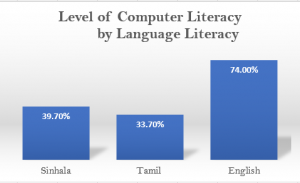
Computer literacy among Tamil literate population is stagnant at 33.70%, whereas computer literacy among English literate population is very high at 74%. These figures indicate that being English literate positively contribute towards computer literacy, as computers are functional in English language. In contrast, lack of English literacy skills among the Tamil literate estate population has resulted in extremely poor level of computer literacy in the estate sector. Lack of English language skills further widens the inequality faced by the vulnerable estate community, blocking the ways bridge digital divide.
- Source of Computer Knowledge
Patterns of ICT education among the estate community is different to that of national patterns, which could be another reason for low computer literacy level in the estate sector (See Figure 5).
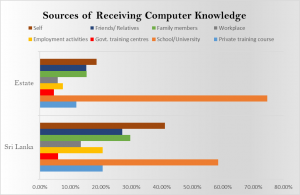
Nearly 75% of computer literate population in the estate sector have received computer knowledge from their schools or universities, whereas only 58.6% of Sri Lanka’s computer literate population rely on their schools or universities for computer knowledge. Thus, schools and universities play a crucial role in developing computer literacy among the estate community. However, with high rate of school dropouts, low availability of ICT teachers and the lack of ICT infrastructure in estate schools have hampered the process of improving computer literacy among school children of the estate sector.
While over 40% of computer literate population in Sri Lanka engage in self-learning to gain computer knowledge, less than 20% of computer literate estate sector use self-learning to obtain computer knowledge. Low self-learning in the estate sector can be attributed to lack of device ownership and the low level of English language skills among estate community. Similarly, nearly 30% of computer literate population in Sri Lanka have received computer knowledge from friends and family, while only around 15% of computer literate estate population has been able to obtain help of family or friends to gain computer knowledge. Due to the already low computer literacy among estate community, youngsters are unable to obtain help of friends and family to gain computer literacy, further limiting sources of computer knowledge.
More than 20% of computer literate Sri Lankans have used private training courses to gain computer literacy, while only 12% of computer literate estate community member have been able to enroll for private training courses. With minimum wage-earning breadwinners, children and youth are unable to afford private training courses to gain computer knowledge, which has further limited sources of computer knowledge for estate community. While Government funded computer training can address this issue, only 5% of computer literate estate community has been able to secure Government funded computer training, indicating a severe shortage of computer training programs by the Government in the estate regions.
- Pandemic Effects
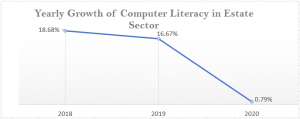
Prior to Covid19 pandemic, estate sector has recorded over 15% year on year growth in computer literacy, which is laudable given the limited availability of resources. However, Covid19 pandemic seems to have hit the progress, where the growth of computer literacy has slowed down to less than 1% in 2020. While other parts of the country experienced higher growth of computer literacy due to pandemic-induced digital disruption, the estate sector is adversely affected in terms of growing computer literacy during the pandemic. As schools and universities are the most crucial sources of computer knowledge for the estate community, the school and university closure during the pandemic has slowed down growth of computer literacy in estate sector. Thus, Covid19 pandemic has further widened inequalities in skills and education of vulnerable estate community, limiting the achievement of UNSDG 4.4 and 4.5.
Recommendations
To close the aforesaid computer literacy gap experienced by the estate sector, Colombo Initiative makes following recommendations:
- Given that schools are the best source of computer knowledge, ICT infrastructure in estate sector schools should be improved. Thus, it is recommended to provide more computers to estate schools utilizing Government funds or donation drives.
- The Government funded computer training programs should be increased in estate areas.
- To support economically disadvantaged estate community, private computer training courses can be offered at subsided rates. Such private training centers can be financially supported through Corporate Social Responsibility (CSR) initiatives of large-scale companies, which will ensure long-term sustainability of training centers, despite receiving low revenue from subsidized training courses.
- As lack of English language skills hinders the computer knowledge acquisition, aforesaid computer training programs should be coupled with English language training programs, which will facilitate self-learning of computer skills in the future.
If you want to Make a Difference & See the Impact, please get in touch with Colombo Initiative
Source of statistics: Department of Statistics, Sri Lanka
UN Sustainable Development Goals (SDGs)

